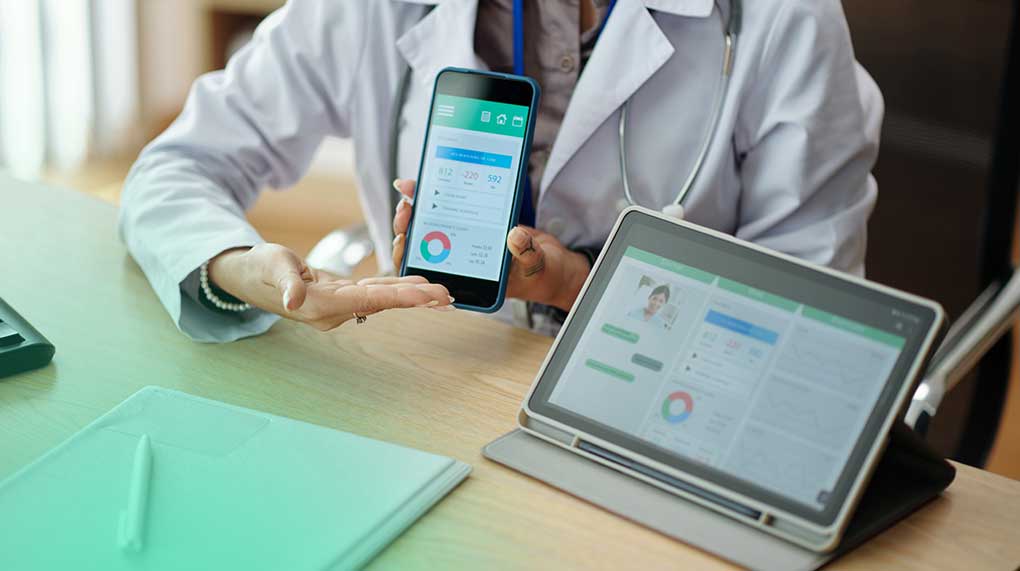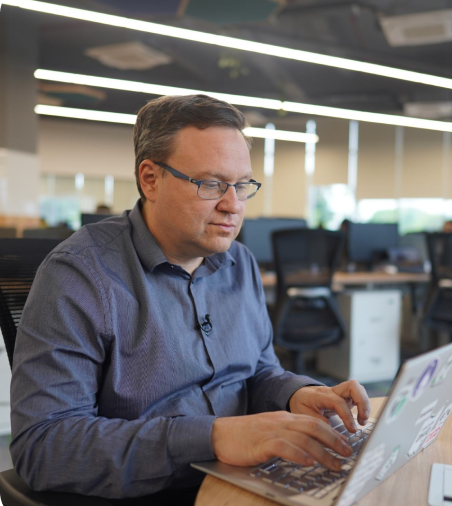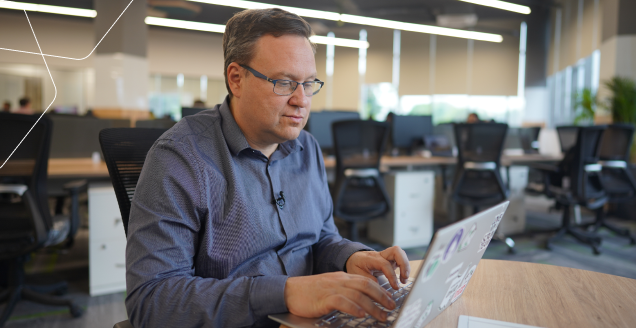2024 Healthcare App Features: Enhancing the Patient Experience and Care

2024 healthcare trends promise to be an exciting continuation of the healthcare industry trends we have seen over the past several years. Innovations and advancements in artificial intelligence (AI) and software technologies have led to an incredible digital infrastructure from which enterprise software development companies can build.
Whether AI integration, devices implementing the Internet of Things (IoT), or cloud-based technologies, a growing number of trends in healthcare promise a bright future for the market and its customers.
AI and Healthcare: A Growing Collaboration
It has become nearly impossible to discuss any industry without diving into the implementation and implications of artificial intelligence, and healthcare is no exception. Potential uses are varied, but some key areas include hospital management, medical imaging analysis, and the research and development of medical practices, tools, and treatments. In all these examples, AI is already proving to be a game changer.
As hospitals and healthcare systems grow in size and complexity, the management burden can be alleviated by well-implemented AI for record keeping, cost-tracking, and detailed analytics on hospital operations. Equally important is the regular testing and diagnosis performed by hospital staff. Services such as X-ray and MRI imaging can be expedited through the rapid analysis and risk assessments possible through AI assistance.
Finally, AI will have an important role to play in the research and advancements to support and enhance our health services. Research into new treatments and medications has begun benefiting from AI’s ability to rapidly analyze and organize, increasing the efficiency of the development process from research to clinical trials and even to production.
Telehealth and Hospital-at-Home: The Rise of Digital Medicine
While healthcare industry trends continue to advance inside the hospital, massive waves are developing outside of it. We are likely to see a continued rise in telehealth and hospital-at-home services, which focus on providing hospital-quality care from the comfort of a patient’s home. Bolstered by COVID-19 restrictions on in-person meetings, telehealth has become a lingering staple of the industry, allowing healthcare providers novel means of assessing and providing care for patient medical needs.
The bedrock of modern telehealth, however, is remote patient monitoring (RPM), which consists of the many applications and devices used to track a patient’s health. Monitors for sleep apnea, heart disease, and blood pressure all play a critical role in doctors’ ability to diagnose and treat, while the devices and connected software feed information needed to be adaptable, reliable, and, most importantly, up to date.
Applications for Healthcare: The AI-Cloud Fusion
While the development of bespoke devices for performing telehealth services continues to grow, there continues to be a market for healthcare applications that can meet the needs of a hospital-at-home program without adding on expensive hardware applications.
If a healthcare application can be downloaded to a phone, it represents an ease of access to the patient that can save cost and time. For 2024, healthcare trends point toward a fusion of AI and cloud technology into existing medical applications, allowing an enterprise software development company to enter the market with a strong, adaptable product.
Healthcare App Features for a Burgeoning Market
Healthcare applications have existed for years, but emerging innovations like AI, cloud technologies, and the IoT concept have unshackled applications from the confines of the hardware they operate on.
Modern apps can meet a range of medical needs and can even replace or enhance existing medical monitoring equipment through wireless connections and additional attachments. So, while the applicability of healthcare apps is wide-ranging, three varieties are well-positioned for a strong showing in 2024:
- Apps for Tracking Health
Telehealth relies on RPM to provide continuous information on the patient’s health and vitals, and new healthcare applications and devices are well-positioned to fill this role.
Apps as simple as pill trackers can help schedule and track treatment regimes. They can also help with appointment scheduling, medical bills, and the secure storage of medical records. Meanwhile, advancements in blockchain and cloud technologies have made healthcare and related apps more secure than ever, addressing issues of medical records, privacy, and security.
- Apps for Treatment and Testing
While bespoke, at-home testing devices have been around for a long time, mobile applications are now positioning themselves to better provide simple testing services from the comfort of your home.
With the addition of a small testing device, mobile phone applications can now analyze and present results for blood tests related to clotting or blood sugar levels.
- Apps for Doctor Communication
One of the simplest but most effective evolutions in healthcare applications harkens back to the age of house calls from doctors. Whether through text, voice memo, or video call, the ability of patients to communicate with their doctors through apps is growing.
VR and AR technologies also represent promising opportunities for doctors and patients to communicate more effectively without meeting in person. While physical ailments often require a physical visit to a doctor, the mental health field has benefited immensely from the fusion of telehealth and mobile applications.
Never before has a licensed therapist been so readily available to those most in need.
2024 Healthcare Trends and Beyond
2024 healthcare trends are a continuation of the progress and advancements of the past several years. Technologies like AI, blockchain, the cloud, and even VR have shown themselves applicable in hospitals and bringing the hospital to you.
As healthcare app features continue to expand, more and more patients will benefit from quality medical care without ever leaving their homes. If telehealth continues with its current momentum, 2024 promises not only to be a banner year for AI and cloud-based integration but also a year of significant advancement for healthcare applications.
As a result, wearable devices are continuing to grow in popularity. The development of miniaturized monitors connected to IoT and powered by the analytical power of AI or cloud computing points to a future market rich in innovation. For custom healthcare software development, that means fertile ground laden with potential.

